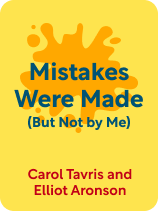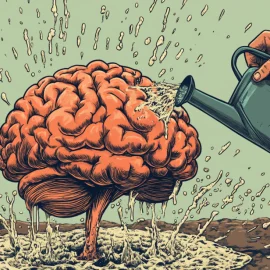

This article is an excerpt from the Shortform book guide to "Mistakes Were Made (But Not by Me)" by Carol Tavris and Elliot Aronson. Shortform has the world's best summaries and analyses of books you should be reading.
Like this article? Sign up for a free trial here.
What is cognitive dissonance? What are the most common ways to reduce cognitive dissonance?
In Mistakes Were Made (But Not by Me), Carol Tavris and Elliot Aronson explain that cognitive dissonance is a psychological state of having inconsistent thoughts and attitudes. This state is often uncomfortable for people, so they try to seek out ways to reduce cognitive dissonance.
Let’s look at how people seek comforting thoughts through three psychological processes.
What Is Cognitive Dissonance?
Cognitive dissonance is an uncomfortable psychological state that occurs when we have two contradictory beliefs, attitudes, or ideas. According to the authors, we also experience cognitive dissonance when our actions conflict with our beliefs or our sense of self. For example, if you find factory farming practices objectionable, you’ll likely experience some cognitive dissonance if you still eat meat.
Cognitive dissonance causes minor to extreme psychological discomfort because it threatens our belief in an ordered, meaningful existence. We’re constantly trying to make sense of the world around us, and we want to believe that our actions and choices are consistent and rational. When we act or think in a way that contradicts our beliefs, we can no longer claim consistency or rationality. To relieve the discomfort caused by this psychological state, we seek ways to reduce cognitive dissonance. Often, this takes the form of self-justification, confirmation bias, and memory distortion.
Self-Justification
Rather than admitting wrongdoing or accepting contradictory beliefs, most people find ways to justify their actions to themselves and others. This process is called self-justification.
The authors distinguish between lying and self-justification—lying requires awareness of what we’re doing. We lie to cover up our actions when we know we’ve done something wrong. In contrast, self-justification is typically an unconscious process. We subconsciously use self-justification to convince ourselves we did the right thing.
This distinction makes self-justification more subtle and persuasive than outright lies as a remedy for the discomfort of cognitive dissonance. While we use lies to deceive others, we use self-justification to deceive ourselves. We truly believe in the reality we create through self-justification: one where we didn’t actually do anything wrong.
Confirmation Bias
According to the authors, we also avoid the pain of dissonance through a mental process called confirmation bias. Confirmation bias causes us to categorize any information that supports our beliefs as reliable and reasonable. Simultaneously, we ignore information that contradicts our beliefs, or we dismiss it as untrustworthy or foolish. For example, if you’re a big fan of a sports team, you’ll think a referee made a fair call when their intervention benefits your team. Likewise, you’ll typically assume the referee made a bad call if it goes against your team.
Confirmation bias helps us decrease dissonance by altering the way we perceive information. If you can ignore or dismiss as unreliable the information that contradicts your beliefs, you won’t feel dissonance when confronted with it. Your beliefs aren’t actually threatened, since you don’t put stock in opposing information; therefore, you can comfortably maintain your current worldview.
Memory Distortion
The final cognitive process we use to overcome dissonance is memory distortion. The authors argue that memories frequently offer unreliable and inaccurate accounts of our experiences. Usually, our brains adjust memories to put us in the best possible light. We remember details that fit our current self-image and forget information that contradicts it. The more important a memory is to your self-image, the more likely you are to remember it in a self-serving way.
Memories are naturally fluid because of the way our brains organize information—every time we retrieve a memory, our brains reconstruct the details to fit into a cohesive narrative. Over time, memories can shift so much that they’re unrecognizable compared to the actual event.
Memory distortion isn’t always for the purpose of self-justification, the authors note, but it often complements that process—it allows us to forget or misremember bad choices we’ve made. These bad choices would otherwise create dissonance by threatening our belief that we’re honest, competent, good, and so on. By misremembering our negative actions in a way that benefits us, we reduce the dissonance they create.
For example, let’s say you pride yourself on being intelligent, diligent, and detail-oriented, but you make a costly mistake on a work assignment. As you recall the event over time, your brain may distort the memory and attribute blame for the mistake to someone else, resolving the uncomfortable dissonance that arises when your belief in your competence is threatened.

———End of Preview———
Like what you just read? Read the rest of the world's best book summary and analysis of Carol Tavris and Elliot Aronson's "Mistakes Were Made (But Not by Me)" at Shortform.
Here's what you'll find in our full Mistakes Were Made (But Not by Me) summary:
- Why we feel discomfort when we act in a way that doesn't align with our values
- How patterns of self-justification can cause our beliefs to diverge sharply from other people’s
- How we can break the cycle of self-justification and hold ourselves accountable






